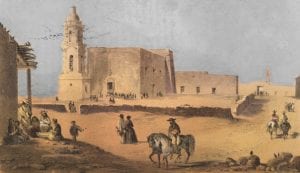By David Rex Galindo, SMU PhD 2010, Professor in the Facultad de Artes Liberales at the Universidad Adolfo Ibáñez in Santiago, Chile
I am very pleased to announce in our history department’s blog that my book To Sin No More: Franciscans and Conversion in the Hispanic World, 1683-1830 will be published by Stanford University Press and the Academy of American Franciscan History in a few weeks.

I started this project as a graduate student in the William P. Clements Department of History at SMU in 2004 under the guidance of Peter Bakewell and the late David Weber. The bulk of my research and a first draft as a doctoral dissertation was conducted thanks to the support I received from my two advisors, two readers (Ed Countryman and Martin Nesvig), the history department, the Clements Center for Southwest Studies, and the Dedman College of Humanities and Sciences. I cannot think of a better place to fulfill my dream of becoming a professional historian and an academic. My two advisors guided and nurtured my intellectual development with generosity, kindness, humanity, and professionalism.
The history department is a hub of intellectual brainstorming that excels in many historical fields, but particularly what interests me the most: borderlands history. I was impressed by the dedication that SMU history faculty gives to graduate students and how we were encouraged to play a pivotal role in the scholarly discussions within the department and beyond. Throughout my six years as a graduate student at SMU, I created a community of friends that will last forever. I have to say that those were some of the best years of my life at both the personal and professional levels. I therefore want to use this venue to express my gratitude to SMU’s history graduate program, the history department and its members and to all the graduate students who have made and are making our graduate program a global reference and a fantastic place to study and work.
 Even before my arrival to Texas, I have always been interested in the history of the Spanish frontiers in North America, particularly the institution of the frontier mission. But studying the missions implied learning about the Franciscan missionaries as well as the missionized. While I encountered a good amount of works that focus on the latter when I started my project, I also found that we knew little on the missionaries, particularly their lives before they reached the frontiers of the Spanish empire. Where did Franciscans come from? What did they learn and how? How were their daily lives? Did they have other evangelical experiences? What type of Catholicism(s) did they practice and taught?
Even before my arrival to Texas, I have always been interested in the history of the Spanish frontiers in North America, particularly the institution of the frontier mission. But studying the missions implied learning about the Franciscan missionaries as well as the missionized. While I encountered a good amount of works that focus on the latter when I started my project, I also found that we knew little on the missionaries, particularly their lives before they reached the frontiers of the Spanish empire. Where did Franciscans come from? What did they learn and how? How were their daily lives? Did they have other evangelical experiences? What type of Catholicism(s) did they practice and taught?
To Sin No More is the result of over a decade of research to find answers to these questions in Franciscan archives, national archives, and libraries on both sides of the Atlantic. The book introduces the reader into the recruiting processes, the Franciscan missionary colleges’ daily operations, the missionary classroom, the dining-hall, the spirituality, and the evangelical ministry to Catholics as well as non-Christians. Overall, I show that what happened in frontier areas like Texas was part of a global enterprise of conversion that sought to introduce Catholicism anew to independent native peoples as much as to revitalize the faith among Catholics in places like New Spain, Peru, and Spain. This book is my particular approach to mission history and frontier studies, the Franciscan program in the Americas, and Atlantic history. I am thrilled to say that after a decade, the book that I started as a graduate student at SMU’s Ph.D. program in History has finally seen the press. The path has been long but also pleasant.

